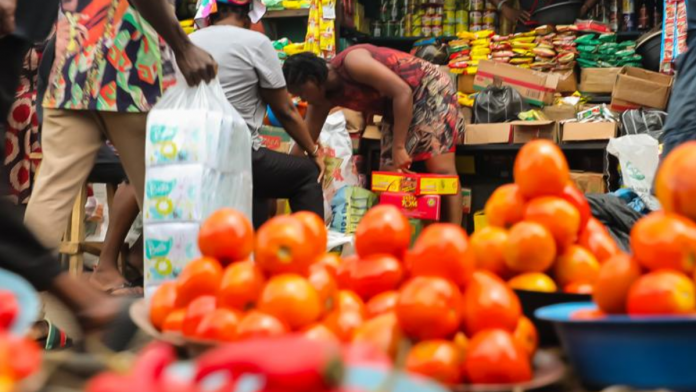News in brief:
â Nigeriaâs key ministers convened a meeting to address rising food inflation by boosting food production and reviewing recent interventions.
â The meetingâs participants praised government efforts as regards food production and called for accurate data to ensure inteventions yield results.
In a bid to combat rising food inflation, Nigeriaâs Ministers of Agriculture and Food Security, Finance and Coordinating Minister of the Economy, and Minister of Budget and Economic Planning, convened a crucial meeting with key stakeholders from the agricultural sector.
This high-level discussion, held over the weekend in Abuja, aligns with President Bola Ahmed Tinubuâs recent declaration of a food security emergency. It also reaffirms the governmentâs commitment to revitalizing the National Agricultural Growth Scheme and Agro Pocket (NAGS-AP) Programme.
According to a press release, Agriculture Minister, Abubakar Kyari said that the meeting focused on two key objectives; boosting food production and analyzing the shortcomings of the 2023/2024 dry season wheat production program implemented in 15 states.
Acknowledging shortcomings in the programâs execution, Kyari explained the need for a comprehensive evaluation to identify and address recurring challenges. To enhance the programâs effectiveness, the minister announced plans to deploy dedicated officers to manage and oversee supply chain activities.
Also, Finance Minister, Wale Edun, underscored the governmentâs commitment to the agricultural sector. He mentioned the availability of substantial intervention funds to support increased production of staple crops like rice, maize, wheat, and cassava.
Meanwhile, Budget Minister, Atiku Bagudu expressed optimism. He stated that every cropping season can produce a miracle with increased investment in Nigeriaâs inherently flexible agricultural landscape.
However, concerns regarding input allocation and distribution also reared its head. Minister Kyari stressed the importance of receiving accurate data on bona fide farmers from individual states. He said this was essential in ensuring effective input distribution.
His statement comes after allegations of round-tripping during the November 2023 dry season program which led to a situation whereby farmers allegedly resold government-provided inputs to agro-dealers at lower prices.
Furthermore, he highlighted ways to combat such abuses and guarantee that inputs reach their intended recipients. He stated that georeferenced farmland information is important alongside accurate data on farmers. This details will enable the government to verify farm sizes and deter âpot-folio farmersâ who exploit the system at the expense of genuine cultivators.
In response to these concerns, Kebbi State Governor Nasir Idris expressed the stateâs keen interest in participating in the second phase of the dry season farming program. He also pledged their commitment to contributing significantly to national food security. Governor Idris highlighted their past initiatives, such as the purchase and distribution of â¦2.8 billion worth of fertilizer to farmers.
Subsequently, he expressed confidence that, with adequate support, Kebbi State farmers could cultivate enough to feed the entire nation.



